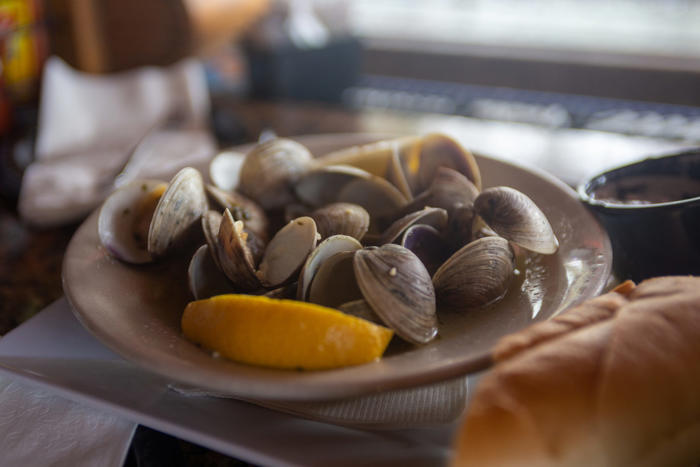What is paralytic shellfish poisoning? What to know about FDA warning, how many are sick.
As the official start of summer approaches, federal officials are warning Americans to take extra precautions when eating oysters and clams to avoid a potentially deadly illness known as paralytic shellfish poisoning.
The U.S. Food and Drug Administration issued an advisory last week, warning restaurants and consumers about elevated levels of biotoxins that have impacted shellfish along the shorelines of Oregon and Washington. Oregon officials have issued sweeping closures to protect the public and said late last month that at least 21 people have been sickened.
Some news outlets are reporting that 31 have become ill, citing the Oregon Health Authority, which hasn't responded to USA TODAY's messages for the most updated figures.
Start the day smarter. Get all the news you need in your inbox each morning.
Elevated levels of naturally occurring toxins that cause paralytic shellfish poisoning were initially detected in shellfish on the Oregon coast on May 17, according to state officials. Since then, state authorities have closed the entire length of the coastline to the recreational harvesting of shellfish, with many bays also closing.
The Washington State Department of Health likewise shut down all recreational shellfish harvesting in Grays Harbor and Willapa Bay over similarly high levels of biotoxins. As of Tuesday, Washington has not reported any illnesses linked to the toxins or paralytic shellfish poisoning.
Potentially contaminated oysters and clams were also distributed to restaurants and retailers in several states outside of Oregon and Washington, warned the FDA. Here's what to know about the advisory.
FDA warns several states to dispose of harvested shellfish
The FDA is advising restaurants and food retailers not to serve or sell − and advising consumers not to eat − oysters or bay clams harvested from certain Oregon and Washington locations on dates starting in May. According to the FDA, these advisories include:
- Certain oysters and bay clams harvested from Oregon growing areas in Netarts Bay and Tillamook Bay in Oregon, harvested on or after May 28.
Shellfish species from growing areas in Willapa Bay, Washington, including:
- Stony Point, harvested between May 26 and 30.
- Bay Center, harvested between May 29 and 30.
- Bruceport, harvested between May 29 and 30.
The shellfish were distributed to restaurants and retailers in the following states:
- Arizona
- California
- Colorado
- Hawaii
- Nevada
- New York
- Oregon
- Washington
The oysters may have been distributed to other states, as well, said the FDA.
What is paralytic shellfish poisoning?
Paralytic shellfish poisoning (PSP) is caused by neurotoxins called saxitoxins or paralytic shellfish toxins. These are produced naturally by marine algae called phytoplankton, and molluscan shellfish can become contaminated when the algal species bloom in the same water in which the mollusks live.
This biotoxin affects the nervous system and paralyzes muscles, according to the Washington State Department of Health. High levels of paralytic shellfish poisoning can cause severe illness and death.
Shellfish can retain the toxins for different lengths of time depending on their natural cleansing cycles, meaning species with slower cycles prolong the risk period for transmission to humans.
Food containing paralytic shellfish toxins may look, smell, and taste normal, and these toxins cannot be removed by cooking or freezing, said the FDA.
This most recent outbreak has been attributed to a "very large" algal bloom that has led to "unprecedented levels" of paralytic shellfish toxins on the coast, according to a statement from Mathew Hunter, shellfish program manager for the Oregon Department of Fish and Wildlife, at a press briefing.

The FDA has warned that shellfish harvested in certain parts of Oregon are contaminated with the toxins that cause paralytic shellfish poisoning (PSP).
Paralytic shellfish poisoning symptoms
Most people with paralytic shellfish poisoning will begin to develop symptoms within 30 minutes of consuming contaminated seafood. Severity and symptoms can vary significantly, meaning the FDA suggests consulting with a healthcare provider as soon as you suspect you may have symptoms resembling paralytic shellfish poisoning.
Common symptoms include:
- Tingling of the lips, mouth, and tongue
- Difficulty breathing and/or respiratory paralysis
- Numbness of arms and legs
- "Pins and needles” sensation
- Weakness
- Loss of muscle coordination
- Floating feeling
- Nausea
- Shortness of breath
- Dizziness
- Vomiting
- Headache
Because there is no antidote for paralytic shellfish poisoning, treatment consists of supportive care, including fluid therapy and respiratory support that may entail mechanical ventilators in more severe cases. Death caused by paralytic shellfish poisoning is usually caused by asphyxiation, as the systems that enable breathing in the body become paralyzed and are unable to function properly.
Patients who survive the first 24 hours have a good prognosis with no expectation of lasting effects, says the FDA.
How to prevent contamination
Restaurants and retailers who handle shellfish should be aware that they are a common source of pathogens, advised the FDA, and food storage, processing and preparation should be done in a controlled environment that limits the potential for cross-contamination.
Steps to prevent cross-contamination include:
- Wash hands with warm water and soap following the cleaning and sanitation process.
- Facilities that have processed and packaged any potentially contaminated products need to properly sanitize cutting surfaces and utensils that may have had contact with the potentially contaminated products.
- Retailers that have sold bulk product should clean and sanitize the containers used to hold the product.
- Regular frequent cleaning and sanitizing of food contact surfaces and utensils used in food preparation may help to minimize the likelihood of cross-contamination.
This article originally appeared on USA TODAY: What is paralytic shellfish poisoning? What to know about FDA warning, how many are sick.
